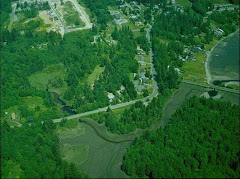As the human population booms in the Puget Sound area and the salmon numbers decline, it is becoming increasingly more vital that restoration projects are implemented in ways that are conducive to both the ecosystems and local communities. Surrounding communities are likely to be affected by stream restoration and habitat improvement projects, but often have a very limited role in their creation. The absence of meaningful public participation and engagement can divide the community, delay the project, increase the expense, and result in a plan that does not reflect the values of the community. The history and local knowledge found within a watershed can be used as a valuable tool to connect people to place, give voice to the community, and provide important information for restoration efforts. The Carpenter Creek Community Mapping Project is an attempt to weave together science, history and local knowledge within the watershed.
The goal of this project is to have community members collect historical data and local knowledge of the Carpenter Creek watershed. Volunteers will be asked to conduct interviews with residents, search libraries and museums for relevant information, including maps and photos, and to inquire with fellow citizens the reasons they value Carpenter Creek. The data will be used to create an interactive web-based map that depicts the community’s historical and current relationship with the drainage. Each piece of information will be linked to its relevant place on the map helping to create a more complete story of the watershed.
It is anticipated that by doing this project we can gain a better understanding of how the valuable knowledge found within local communities can be used to help strengthen peoples’ ties to their watershed and contribute to the creation of effective restoration projects. The Carpenter Creek Community Mapping Project will serve as a case study to help answer some of these questions and will hopefully inspire us to look closely at our relationships with our local rivers and streams.
Subscribe to:
Post Comments (Atom)

No comments:
Post a Comment